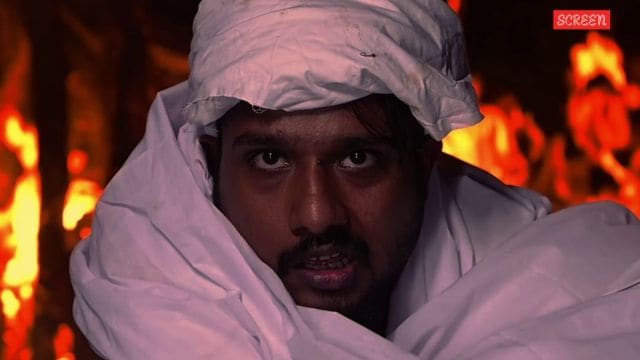Click here to follow Screen Digital on YouTube and stay updated with the latest from the world of cinema.
Meet Sanket Shikriwal, Bihar rapper who blends jazz with Bhojpuri to overturn a stereotype
Going against the grain, Sanket Shikriwal, a young artist from the Bihar-Jharkhand region, is doing something seemingly unfathomable
 Shikriwal's work is gaining momentum, proving that there’s so much more to the language than what’s portrayed in the mainstream (Image source: @shikriwal/Instagram)
Shikriwal's work is gaining momentum, proving that there’s so much more to the language than what’s portrayed in the mainstream (Image source: @shikriwal/Instagram)In an age when the Internet is busy scouring regional entertainment for new with-it flavours, Bhojpuri music brings to mind loud beats, suggestive videos, and vulgar lyrics, overshadowing the region’s musical heritage. In that crowd, Bihar’s roots in music have been drowned. The state has produced some of India’s greatest poets, writers, and classical musicians, but good Bhojpuri music gets overlooked by the viral-only algorithm.
Going against the grain, Sanket Shikriwal, a young artist from the Bihar-Jharkhand region, is doing something seemingly unfathomable. He has taken jazz and blended it with Bhojpuri hip-hop. His new album, Natya Alapika, with its 18 tracks, does something bold — it has a track featuring a saxophone, alongside his fierce Bhojpuri verses, which is gritty and refreshing!
Shikriwal’s work is gaining momentum, proving that there’s so much more to the language than what’s portrayed in the mainstream. “It’s motivating,” he says in an interview with SCREEN. “You need love from the audience to keep doing this. And I believe anyone making good art in Bhojpuri will be seen, whether it’s music or films. People are just waiting for something real.”
View this post on Instagram
Shikriwal’s musical journey began with poetry. Back in school, he wrote poems for competitions. However, his writing didn’t feel “poetic” enough, as it was laced with profanity. Eventually, he found his voice in hip-hop and realised he didn’t have to water down anything. “Hip-hop gave me the freedom to write what I really felt,” he explains. “There was no pressure to sound elite or clever. I could be honest.”
That honesty is what drives his music even today. His lyrics don’t glamorise Bihar, nor does he complain about it. Through his songs, he shares the reality. Raised in an academic household, Shikriwal says he always had a certain level of freedom. “My parents still don’t fully understand what hip-hop is, but they trust me,” he laughs. “They saw how serious I was about this. There was no other option, really. Either they (had to) support me, or they didn’t. Luckily, they chose to support me.”
His formal music education happened in Noida, where he studied music production and met other like-minded artists. But real learning came from observation and instinct. Songs like Purani Bazaar stand out not just for their sound but for their texture. One moment, he sounds like he’s chewing tobacco and spitting between verses, the next, he’s weaving through with thoughts on society, justice, and personal struggles.
So what drives this intensity? “It’s not about trying to fix Bihar’s image,” he says. “I just speak from my experience. And when you’re underprivileged and you dream big, there’s a certain mindset that comes with that. That’s what I’m trying to represent.”
Shikriwal criticises how Indian hip-hop artistes often imitate Western trends without understanding why they are doing that. “If you’re inspired by someone, understand their mindset, not just their style,” he says. He emphasises regional artistes should be honest in their expression instead of copying others. “Delhi rappers rap fast because that’s how people speak there. You need to stay true to your own identity,” he says.
But staying true comes with its own challenges. Shikriwal’s songs end up on audiences who are used to Bhojpuri fare. However, the 28-year-old artist sees it as an opportunity. “When I put Bhojpuri songs, my content gets pushed to those kinds of people who consume Bhojpuri songs only. But my whole selling point is, I appeal more to those people who are a little annoyed with the Bhojpuri industry, that this is enough,” he says.
He acknowledges the criticism of Bhojpuri music, especially regarding its portrayal of women. “You can’t call any one thing vulgar in art,” he says, “but the problem starts when everyone starts making the same kind of song. There’s no variety anymore. That’s dangerous. Folk music is beautiful. But it’s almost disappeared now. You barely hear it during festivals such as Holi anymore. I want to bring that spirit back.”
When asked whether he wants his music to go viral, Shikriwal says, “Of course I want people to listen. Who doesn’t? But I don’t make music for virality. I make what I feel. That’s it. If it connects, great. If not, I’ll keep making it anyway.”
“Some people make music just for the trend. Holi comes, and they make a Holi song—even if they don’t celebrate it. That’s content. I’m an artist. If I write about Raksha Bandhan, it’s because I have something personal to say.”
When asked about his dream collaboration, he shares his admiration for Bollywood artistes Javed Akhtar, Piyush Mishra, and Varun Grover.
So, does he believe he can bring about real change in Bhojpuri music? “I already have,” he says. “I have already achieved one thing. Those who have heard me or those who will hear me in the future (know) it can be done differently. You can commercialise this. The day I walk in my city with some money, everybody will start doing it. I want to inspire people with what I am doing. If you want to rap, write it in your own language.”
“It’s easier, more fun, more attention-seeking. And it’s a monopoly. You can live in your language like a king or a king’s son,” he concludes.
And maybe that’s what the Bhojpuri music industry needs right now, not a new song, but a new mindset.





- 01
- 02
- 03
- 04
- 05






























